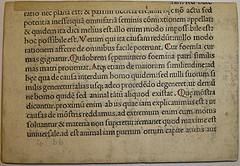 In turn, the repair of a situation caused by an individual who violated the law or the establishment of a relationship of parity between the litigants are the idea of corrective justice. in close liaison with the judicial function of the city-state, no However, it may exceptionally be delegated to private individuals when exercising their rights. In particular, the thought of Aristotle has a different perception of the cultural-called trial. Ethics in Nicomachus, described the trial as a global understanding of man, which was formed from the perception of what is fair. Equity, in turn is based on truth. According to the philosopher, rightly, to judge is to judge according to truth. proach. For better assimilation of the subject, which represents the thinking of the philosopher about his theory of corrective justice, through the following scheme: The line “as the reason) (CORRECT JUSTICE MORAL EXCELLENCE (PRODUCT QUALITY BACKGROUND OF THE ACTION REVIEW HUMAN CAPITAL AS EFFECTIVE AS) Different- scientific knowledge-LOW philosophical wisdom, therefore, is a special kind of discernment credit converges to a natural one, the judge bowed wide, as an older person who has acquired through the proper understanding of intelligence, of course Brought by experiential learning. Knowing the philosophy that clearly has no such natural origin.
In turn, the repair of a situation caused by an individual who violated the law or the establishment of a relationship of parity between the litigants are the idea of corrective justice. in close liaison with the judicial function of the city-state, no However, it may exceptionally be delegated to private individuals when exercising their rights. In particular, the thought of Aristotle has a different perception of the cultural-called trial. Ethics in Nicomachus, described the trial as a global understanding of man, which was formed from the perception of what is fair. Equity, in turn is based on truth. According to the philosopher, rightly, to judge is to judge according to truth. proach. For better assimilation of the subject, which represents the thinking of the philosopher about his theory of corrective justice, through the following scheme: The line “as the reason) (CORRECT JUSTICE MORAL EXCELLENCE (PRODUCT QUALITY BACKGROUND OF THE ACTION REVIEW HUMAN CAPITAL AS EFFECTIVE AS) Different- scientific knowledge-LOW philosophical wisdom, therefore, is a special kind of discernment credit converges to a natural one, the judge bowed wide, as an older person who has acquired through the proper understanding of intelligence, of course Brought by experiential learning. Knowing the philosophy that clearly has no such natural origin.
philosopher Aristotle says nobody is by nature. What then is the discernment? When he said the wisdom of the soul is the provision related to what is fair . As additional analysis, Perelman’s victory, the latter informs us that Plato shows a clear preference for a concept of justice that is based on otherness, Unlike Aristotle, who prefers to indicate the corrective justice as an expression of the virtue of competition, such as equity (here), and the mercy and generosity.
![Syndicate this site using RSS [x]](https://www.victoriabusinesstalk.com/wp-content/themes/mad-meg/images/rss.png)